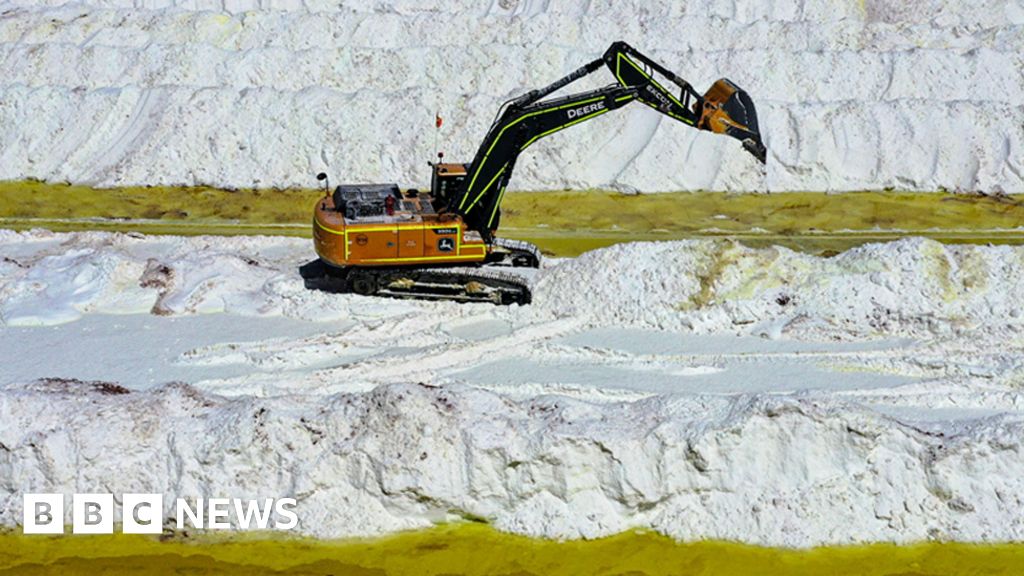…
As Chinese companies have increased their overseas mining operations, allegations of problems caused by these projects have steadily risen.
The Business and Human Rights Resource Centre, an NGO, says such troubles are “not unique to Chinese mining” but last year it published a report listing 102 allegations made against Chinese companies involved in extracting critical minerals, ranging from violations of the rights of local communities to damage to ecosystems and unsafe working conditions.
These allegations dated from 2021 and 2022. The BBC has counted more than 40 further allegations that were made in 2023, and reported by NGOs or in the media.



How much in terms?
I’m not sure what you are asking, but if it’s asking how much electrifying a railway would cost, it depends on what you are doing.
The cost to electrify an existing railway is only around 1-5 million dollars a mile depending on locality. Which is cheaper than building a two lane undivided road ( 3-4 million per mile), and vastly cheaper than expanding an existing highway (10 million per lane per mile).
Again, this only seems expensive or materially difficult if you don’t know anything about mass transit.
In terms of tons of CO2. That’s generally how such things are measured.
Lol, please reread your question. It was an incomplete sentence, I think you may have mistyped. To answer your question.
The actual installation of electric rail would be minimal compared to a road, I mean it’s not like we’re having to move literal tons of material for every km of wiring.
However the real CO2 savings comes from taking diesel trains off of the tracks.
I asked about how much CO2 building it and maintaining it would emit. That doesn’t answer it.
So you don’t care about the total sum of CO2 involved in the project? Then what’s the point of your question?
Are you suggesting we only invest in investing in solutions with zero C02 emissions?
Compared to a single highway lane
So the production and installation would be several magnitudes less than building a single lane highway.
Maintenance is a more difficult thing to estimate for trains, as most environmental impact studies include the maintenance and disposal of the actual trains into the equation.
If you want to you can figure it out yourself, but I can guarantee you that it’s lower than anyother transportation network infrastructure.
Why are you bringing up building more highways? Why would more highways need to be built? There are plenty of highways and there are plenty of rail lines. The question is if building lines to electrify all of the rail lines in the world would be done fast enough with a low enough carbon output to mitigate climate change.
Because if it can’t be done it quickly enough, it’s not a good solution except in the very long term.
Well first of all, because we began this conversation with you claiming there isn’t any better option than battery powered vehicles… But mostly, because we are talking about a transportation network that will need to accommodate the continued growth of the population. We clearly don’t have enough highways, just look at how bad congestion is in the vast majority of our larger cities, look at how much we are expanding the highways we already have. We clearly don’t have enough rail, just look at how dependent we are on semi trucks for long distance shipping.
The only way to relieve this growing traffic problem is to make our transportation networks more efficient, and the most efficient and green form of transportation is electric rail, and by a large margin.
It’s already happening… As I said 1/3 of all rail is already electrified, with the majority of unelectrified rail being located in the US. We are one of the only large countries that utilize diesel engines for the majority of our rail network. Just look at Europe and Asia and see how much they are investing into highspeed rail. America is the only place that rejects public transportation options, and it’s almost entirely to protect fossil fuel and vehicle manufacturers.
Couldn’t you say the same about electric cars? How long do you think it’s going to take to get Americans to replace over 250 million vehicles with combustion engines on a volunteer basis?
I still don’t know why you are dying on this particular hill, especially considering you are clearly ignorant about the topic? You literally thought that all electric trains were battery powered… What gives you the confidence to be so bold, yet so wrong?
Seriously, don’t take my word for it. Just set aside your biases and do little research about the topic and I’m sure you would agree. There’s a reason why the most progressive state in America on climate initiative is dumping billions into highspeed rail, and there’s a reason why conservatives are spending millions to try and stop it.
You’re still not telling me how much carbon output would be generated by electrifying every rail line on the planet.
Lol, I don’t see how that pertains to this argument? You haven’t answered a number of my questions, I’m just not choosing to be pedantic about it.
You’re not telling how long it will take to replace every car in America, or what the carbon output of that replacement and disposal of old vehicles would be.
Stop being an academically dishonest ass, and just admit you are speaking out of ignorance.